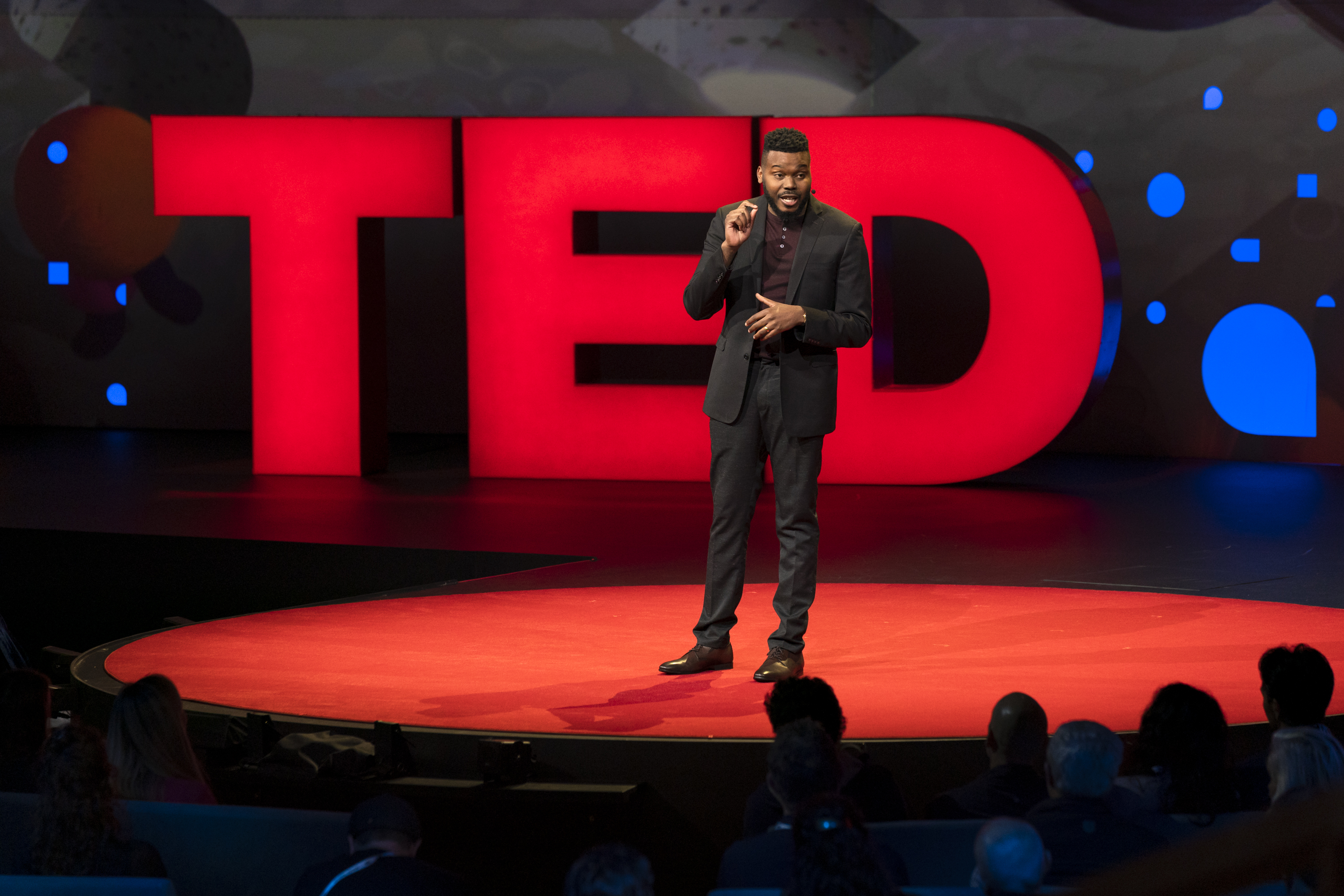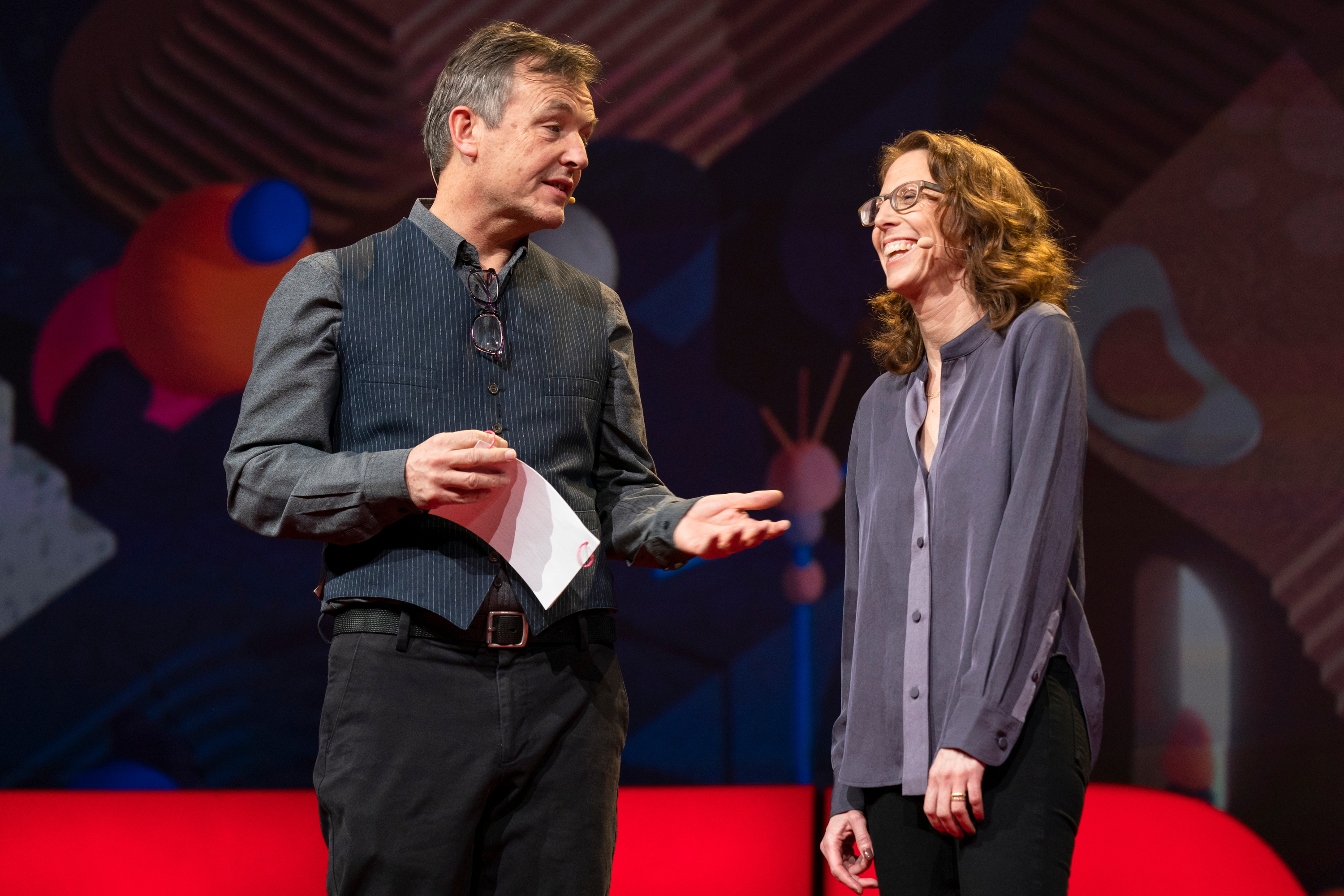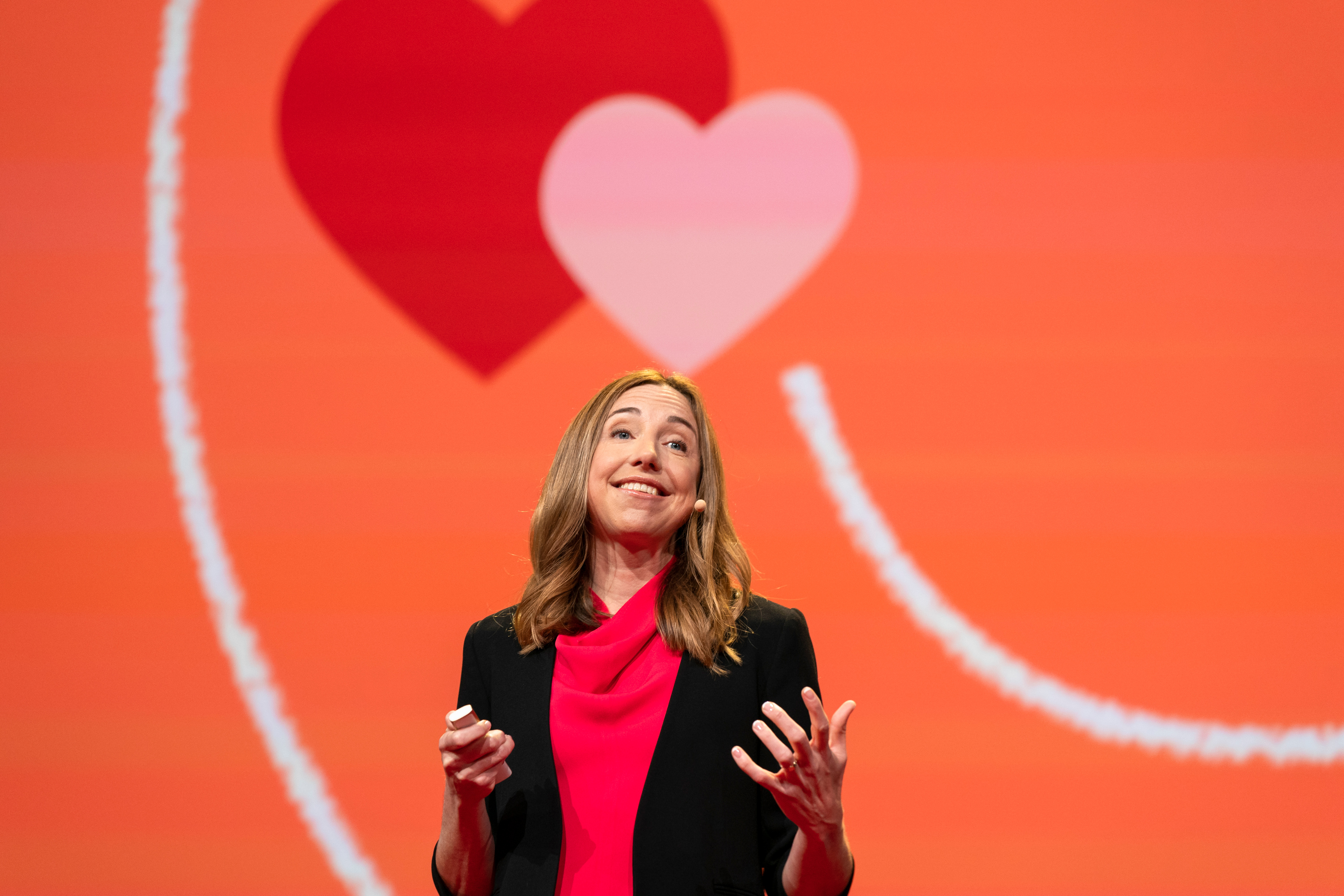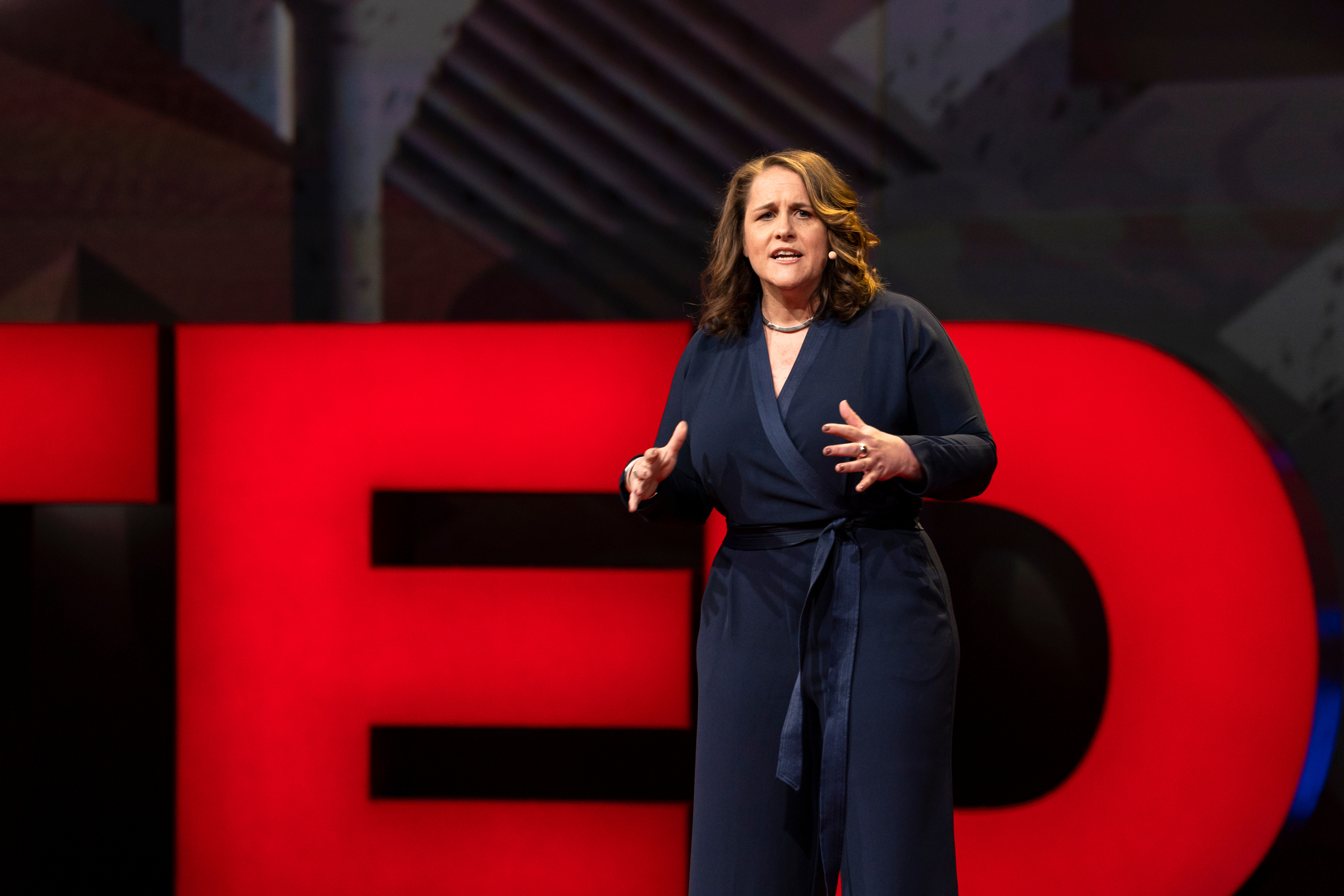
“When we see someone different from us, they should not reflect our fears, our anxieties, our insecurities … but we should see ourselves. We should see our common humanity,” says Michael Tubbs, mayor of Stockton, California. He speaks at TED2019: Bigger Than Us, on April 17, 2019, in Vancouver, BC, Canada. (Photo: Marla Aufmuth / TED)
To kick off day 3 of TED2019, five speakers explored big shifts: challenging accepted wisdom on love, giving, leadership, truth — and illegal substances.
The event: Talks from TED2019, Session 5: Mindshift, hosted by TED’s Chris Anderson and Corey Hajim
When and where: Wednesday, April 17, 2019, 8:45am, at the Vancouver Convention Centre in Vancouver, BC
Speakers: Rick Doblin, Katie Hood, Elizabeth Dunn, Claire Wardle and Michael Tubbs
Also announced: The TED2020 Idea Search launches today! Have a great idea you want to share with the world? Learn more and apply today >>

Head of TED Chris Anderson and TED Business Curator Corey Hajim host Session 5 of TED2019: Bigger Than Us, April 17, 2019 in Vancouver, BC, Canada. (Photo: Bret Hartman / TED)
The talks in brief:
Rick Doblin, psychedelics researcher and founder of the nonprofit Multidisciplinary Association for Psychedelic Studies (MAPS)
- Big idea: Psychedelics, when used responsibly, have the potential to alter our brain chemistry for the better and help us heal from psychological traumas such as PTSD and addiction.
- How? Rick Doblin has led the crusade to lift the decades-old ban on psychedelic research. Psychotherapy paired with substances like LSD and MDMA (ecstasy) shows promise for the treatment of PTSD, depression, substance abuse and more. By reducing the activity in certain parts of the brain, psychedelics allow people to experience a shift in perspective that leads to a heightened sense of unity, shared humanity, altruism, emotional awareness and even spiritual connection. Doblin hopes that psychedelics, viewed through the lens of science and medicine, can help bring about a true global renaissance of positive, healing experiences.
- New (old) word: “Psychedelic,” meaning mind-manifesting
- Quote of the talk: “Humanity now is in a race between catastrophe and consciousness. The psychedelic renaissance is here to help humanity to triumph.”
Katie Hood, CEO of the One Love Foundation and relationship revolutionary
- Big idea: There’s a crucial difference between healthy and unhealthy love, and there are sure-fire ways to recognize the difference.
- How? There are five signs of unhealthy love: intensity, isolation, extreme jealousy, disrespect and volatility. Isolation could mean that your partner takes away your independence, pulling you away from your family and friends. Volatility within an unhealthy relationship can look like constant ups and downs, as well as unpredictable and shocking behavior. Katie Hood believes that there’s a way to combat these unhealthy behaviors — and it’s not as hard as we may think. To build and maintain healthy love, a few core elements must be present: open communication, mutual respect and trust. No one is perfect — we all have bad moments where we don’t treat those we love the way we should. But by practicing these core elements as much as possible, we can put ourselves on the path to better and healthier love.
- Quote of the talk: “For too long, we’ve treated relationships as a soft topic, when relationship skills are actually one of the hardest and most important skills to master in life. Not only can knowledge about unhealthy signs help you avoid falling down the rabbit hole of unhealthy love, understanding and practicing the art of being healthy can improve nearly every aspect of your life.”

“If you’re running a charity, don’t reward your donors with pens and calendars. Reward them with the opportunity to see the impact that their generosity is having and to connect with the individuals and communities they’re helping.” says happiness researcher Elizabeth Dunn. She speaks at TED2019: Bigger Than Us, on April 17, 2019 in Vancouver, BC, Canada. (Photo: Bret Hartman / TED)
Elizabeth Dunn, happiness researcher and author
- Big idea: Humans have evolved to feel a boost of joy when we help others. We can lean into that joy by making a personal connection with those we help, amplifying our happiness and inspiring us to do more.
- How? Elizabeth Dunn’s research revolves around how giving to others makes us happier, but she realized: she rarely felt happy donating to charity herself. That changed when Dunn helped support a family of Syrian refugees as they prepared to relocate to Canada. She saw how her time and resources helped the family settle into their new home and felt encouraged to do “whatever it took to help them be happy.” Instead of feeling like we’re donating into a distant void, we can nurture lasting relationships — and increase our happiness — by seeking a personal touch when we give back.
- Quote of the talk: “If you’re running a charity, don’t reward your donors with pens and calendars. Reward them with the opportunity to see the impact that their generosity is having and to connect with the individuals and communities they’re helping.”

Misinformation expert Claire Wardle asks: But how do halt the spread of untrustworthy, sometimes dangerous content without quashing freedom of expression? She speaks at TED2019: Bigger Than Us, on April 17, 2019 in Vancouver, BC, Canada. (Photo: Marla Aufmuth / TED)
Claire Wardle, misinformation expert, executive chair of First Draft and head of CIVIC
- Big idea: We can halt the spread of untrustworthy, dangerous online content by coordinating a global network of internet users and organizations to rebuild our information commons.
- How? Major tech companies are taking their best shot at solving the issue of misinformation, but let’s be honest: no one wants them to be the guardians of truth and fairness online (and neither do they). While governments are calling for regulation to clean up the information ecosystem, it’s struggling to keep up with tech’s pace of change. What’s the missing link? We, the citizens of the internet — everyday users, journalists, educators, software developers and beyond. Wardle offers one such way we could band together to accelerate solutions: by “donating” our social data, for instance, we could enable researchers gain a bigger view of this problem. Could people and organizations collaborate to build a new infrastructure for quality information, following the model of Wikipedia? This project would span the globe — and the very future of the internet could depend on it.
- Quote of the talk: “Can we build out a coordinated, ambitious response that matches the scale and complexity of the problem? I really think we can. Together, let’s rebuild our information commons.”
Michael Tubbs, mayor of Stockton, California
- Big idea: We can build new civic structures without the curse of racism — and built-in bad outcomes.
- How? Once we view our neighbors as no different from ourselves, we can begin to restructure our societies. Through governing strategies that recognize the racist systems that place people in compromised situations — and that view impoverished and violent communities with compassion — Michael Tubbs is helping to lower Stockton’s per capita murder rate (which rivals Chicago’s) and raise the city’s economic prospects.
- Quote of the talk: “When we see someone different from us, they should not reflect our fears, our anxieties, our insecurities, the prejudices we have been taught, our biases, but we should see ourselves. We should see our common humanity.”